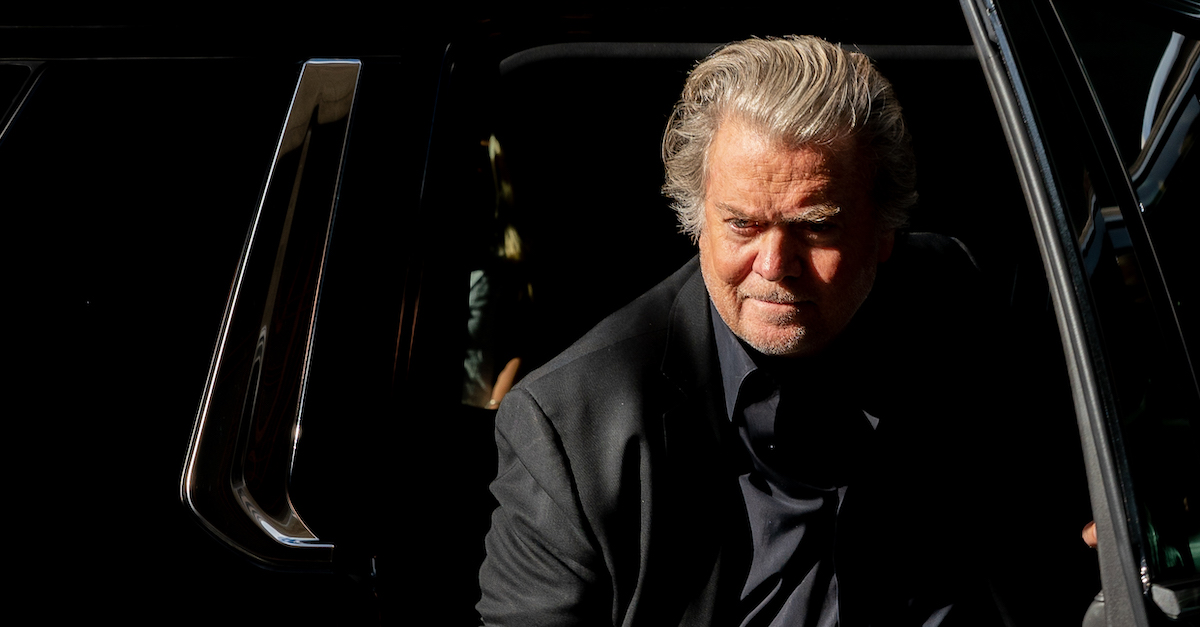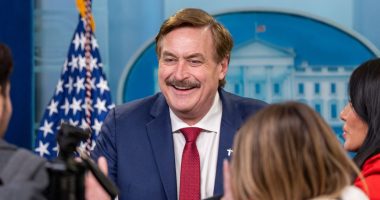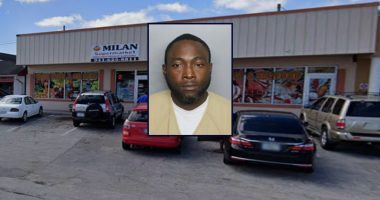
Steve Bannon, former advisor to former President Donald Trump arrives at the NY District Attorney’s office to turn himself in on Sept. 8, 2022 in New York City. (Photo by David Dee Delgado/Getty Images)
There is simply nothing Steve Bannon can say that is new or would support any “substantial question” resulting in a reversal of his contempt of Congress conviction or warranting a completely new trial, according to a new motion from federal prosecutors filed on Monday.
The 25-page motion from the Justice Department was expected following an order issued on June 12 from a trio of appellate judges on the U.S. Court of Appeals for the District of Columbia Circuit. Bannon had filed an emergency appeal seeking to delay his 4-month sentence after U.S. District Judge Carl Nicholas, a Trump appointee, had ordered he report to prison by July 1, as Law&Crime reported.
Prosecutors had already asked the court to lift a stay on his sentence this May when the D.C. Circuit Court of Appeals rejected Bannon’s attempt to stay free pending appeal. The order that he finally go to prison was a long time coming: Bannon was first convicted by a jury in 2022 on two counts of contempt of Congress for refusing to comply with testimony and records requests from the now-defunct House Select Committee to Investigate the Jan. 6 Attack on the U.S. Capitol. Bannon was finally sentenced in October 2022 but has yet to serve a day in prison on appeal.
Bannon now has just a few options left and all of them are ones that federal prosecutors seek to foreclose. He can try an appeal before all 11 judges on the D.C. Circuit Court or he must beg the Supreme Court to intervene.
The high court has already, however, roundly rejected such requests from the similarly-situated and charged former Trump adviser Peter Navarro. Navarro was also found guilty on two counts of contempt of Congress and like Bannon, was sentenced to spend four months in prison. Navarro is nearing the end of his sentence and should be released in the next few weeks.
Bannon primarily argues that the “mental state required for contempt of Congress presents a ‘substantial question’ justifying release” but prosecutors say he “does not address the issue in context of potential panel rehearing or rehearing en banc” but instead merely “focuses his argument on how he thinks the Supreme Court might view Licavoli,” prosecutors wrote.
Mafioso Peter Licavoli was held in contempt of Congress despite the fact that his lawyer told him not to appear for testimony about mob crime in the 1950s. Long standing precedent has since established that people who “willfully” refuse congressional subpoenas can be penalized regardless of their reason.
As for Bannon, prosecutors argue too that he “does not establish that the mens rea issue amounts to a ‘substantial question”” nor does he provide any argument that “this court or the Supreme Court will exercise its discretion to grant rehearing or a writ of certiorari and set aside his conviction.”
Specifically, federal prosecutors return to the core of their argument against the short-lived Trump White House adviser when he went to bench trial.
Despite Bannon’s insistence, they say there exists “no evidence that, at the time of his subpoena, President [Donald] Trump did anything more than give vague directions about ‘potentially’ privileged information, which did not amount to an assertion of executive privilege.”
And contrary to Bannon’s claim, they wrote Monday, Trump’s attorney at the time, Justin Clark, never advised Bannon to ignore the committee, either.
“Rather, Clark made clear that he had not suggested total noncompliance and that he did not believe Bannon was immune from testifying,” Monday’s motion states.
But even if the facts were “novel,” prosecutors wrote, “the legal issue here is not.”
“The application of settled legal principles to new facts does not create a substantial question of law,” they wrote.
Bannon has quibbled with the government over the meaning of “willfully,” suggesting it can only mean “with knowledge that his conduct was unlawful” but prosecutors say that “willfully” is dependent on the context in which it appears and that the context in Bannon’s case means the word can be construed as “deliberately” and “intentionally.”
“Without the ability to enforce its subpoenas, Congress ‘could be seriously handicapped in its efforts to exercise its constitutional function wisely and effectively,” prosecutors wrote.
Bannon’s defense to ignoring the Jan. 6 committee subpoena has rested on his claim that he received this advice from attorney Robert Costello but again, prosecutors say, the Supreme Court has repeatedly found that those people who “refused to answer ‘in good faith on the advice of competent counsel’” did not entitle them to a new trial because a defendant’s “mistaken view of the law is no defense.”
Prosecutors acknowledged Bannon has historically called this “thin” logic by the courts, but he still offers nothing in the way of showing “any defect in the Court’s logic.”
Bannon has argued the Supreme Court today might look differently on his case than they did in the past but this speculation is too amorphous for the appeals court to seriously entertain, according to prosecutors.
“[The] Supreme Court’s docket six or seven decades ago says nothing about the likelihood of certiorari today,” the motion states.
Bannon’s “baseless allegations of politically motivated prosecutions” as well as his speculation about why Navarro’s emergency request was denied do not help him either, prosecutors wrote.
Moreover, as the Jan. 6 committee itself reminded Bannon when first making their requests: most of the topics tied to the subpoena had “nothing to do with any communications with President Trump and indeed concerned events long postdating Bannon’s service in the Executive Branch.”
Even if executive privilege applied to some of what investigators sought, it still did not mean Trump had sanctioned “complete noncompliance.” [Emphasis original]
No reasonable jury could conclude that Bannon operated in good faith when he ignored the subpoenas, the motion underlines.
Prosecutors also urged the court to ignore Bannon’s comparisons of his own situation to that of subpoenas sent to Justice Department attorneys regarding the Hunter Biden prosecution.
Bannon earlier alleged that the DOJ had instructed lawyers in its Tax Division to refuse to comply with congressional subpoenas investigating President Joe Biden’s son.
“[B]ut there is an important difference between government attorneys’ noncompliance with congressional subpoenas because they have been ordered not to comply [citation omitted] and a private individual’s unilateral decision to engage in total defiance of the subpoena on the ground of executive privilege even when told by a representative of the former president that he is not immune from testifying and may not engage in total noncompliance,” prosecutors wrote Monday.
Finally, the attorneys also urged the appeals court to debt Bannon’s claims that his freedom on appeal is supported by a “strong public interest.”
“Like the length of his sentence, Bannon’s role in the political discourse is simply not a relevant factor under 18 USC 3143(b)(1). Bannon also cannot reconcile his claim for special treatment with the bedrock principle of equal justice under the law. Even-handed application of the bail statute requires Bannon’s continued detention,” the motion concludes.
An attorney for Bannon did not immediately respond to request for comment.
Have a tip we should know? [email protected]









